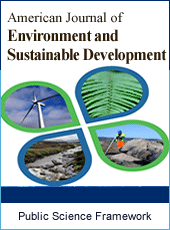American Journal of Environment and Sustainable Development
Articles Information
American Journal of Environment and Sustainable Development, Vol.6, No.3, Sep. 2021, Pub. Date: Aug. 30, 2021
The Impact of Rainwater Harvesting Ponds on the Ecosystem Productivity in Rwanda
Pages: 83-93 Views: 1513 Downloads: 274
[01]
Kirabo Justine, Faculty of Environmental Studies, Option of Environmental Economic and Natural Resource Management, University of Lay Adventists of Kigali, Kigali, Rwanda.
[02]
Maniragaba Abias, Faculty of Environmental Studies, University of Lay Adventists of Kigali (UNILAK), Kigali, Rwanda.
This paper aimed to investigate the influence of rainwater harvesting ponds on ecosystem productivity in Rwanda by referring to Cyeza sector of Muhanga district. Nine parameters of water sampled namely PH, electric conductivity, total dissolved solids, calcium, magnesium, HCO3, sodium, PO4 and NO3 were analyzed to come up with water quality assessment in ponds. Provisioning and regulating services as ecosystem services were discussed based on pond water availability and quality. SPSS, laboratory and Microsoft excel were used to analyze these water parameters and spread the resulting nationally. The results showed that the water sample taken was not desirable for both animal and human drinking (affect health problems) but was also showed that the water was crucial for farming irrigation that leads to plant growth (contain some minerals as Na, Mg, Na that are necessary for plant development). 75.5% of farmers testified that RWH ponds offer them good crop yields, 98.1% of the respondents testified that before adopting RWH technology, the level of crop productivity was totally low, whereas after adopting RWH ponds, the findings showed that the level of crop productivity was increased from moderate to very high level represented by 52.8%, 37.7% and 9.5% consecutively. This implies that crop productivity has been dramatically increased after adopting RWH ponds as shown in the table 7. The results of this study can help policy makers to understand the community requirements and ensure spread of policies that could help farmers to adopt and use efficiently rainwater harvesting ponds that lead them to good cropping yields.
Rain Water Harvesting Ponds, Ecosystem, Productivity, Cyeza Sector and Rwanda
[01]
Ravallion, (2015). Managing Water in Rainfed Agriculture: Th e Need for a Paradigm Shift’, Agriculture Water Management, Vol. 97, pp. 543–50.
[02]
Krishiworld. (2014). “Water Resources.” Krishiworld: The Pulse of Indian Agriculture.
[03]
Prinz, (2009). Water Harvesting: Past and Future.” In: Pereira, L. S. (ed.), Sustainability of Irrigated Agriculture. Proceedings, NATO Advanced Research Workshop, Vimeiro, 21-26.03., Balkema, Rotterdam, 135-144.
[04]
Mbilinyi, B. P., S. D. Tumbo, H. F. Mahoo, E. M. Senkondo and N. Hatibu. (2015). “Indigenous Knowledge As Decision Support Tool In Rainwater Harvesting.” Physics and Chemistry of the Earth. 792–798.
[05]
MINAGRI (2017) Agricultural Rainwater Harvesting Interventions (ARWHI). Manual Final Report, Ministry of Agriculture and Animal Resources in collaboration with World Agroforestry Centre (ICRAF), Kigali. Published also by Hortfresh Jounal, 17, 14-15.
[06]
Malesu, M., Oduor, A. R. and Odhiambo, O. J. (2008) Green Water Management Handbook: Rainwater Harvesting for Agricultural Production and Ecological Sustainability. World Agroforestry Centre ICCRAF, Nairobi, 229 p.
[07]
Bekele, A. S., Okello, J. and Ratna, V. R. (2014) Adoption and Adaptation of Natural Resource Management Innovation in Small Holder Agriculture: Reflection on Key Lessons and Best Practices. Environment, Development and Sustainability, 11, 601-619.
[08]
WRI et al., (2015). Improving the measurement and analysis of African agricultural productivity promoting complementarities between micro and macro data. Technical Paper No. 27. Office of Sustainable Development. Bureau for Africa. USAID publication, Washington, D.C.
[09]
Ngigi, S. N. (2015) Rain Water Harvesting for Improved Food Security. Promoting Technologies in the Greater Horn of Africa. Greater Horn of Africa Rainwater Partnership (GHARP). Kenya Rainwater Association (KRA).
[10]
Getachew A., (2016). ‘Rainwater Harvesting in Ethiopia: An overview’. World Bank. http://www.krishiworld.com/html/water_resources1.html.
[11]
MINIRENA (2015). Ministry of Lands, Environment, Forestry, Water and Mines Rainwater collection and utilization in Rwanda, Project completion report.
[12]
NISR (2012). The Fourth Integrated Household Living Conditions Survey (EICV4); Main Indicators Report; Kigali.
[13]
Muhanga District, (2007), District Development Plan 2008-2012.
[14]
Kothari, (2004). Research methodology: Methods and techniques, 2nd ed, New Age International, New Delhi).
[15]
Williams, (2015). Productivity and land enhancing technologies in the northern Ethiopia: Health.
[16]
World Bank. (2005). The Wealth of the Poor: Managing Ecosystems to Fight Poverty. Washington D.C., WRI.
[17]
GEO4. (2015). Global Environmental Outlook 4: Environment for development. United Nations Environment Programme, Nairobi/ Progress Press, Malta.
[18]
Dahiya et al., (2016). Water Resources. Krishiworld: The Pulse of Indian Agriculture, http://www.krishiworld.com/html/water_resources1.html.
[19]
Tariq et al., (2016). Review on the effectiveness and impacts of small- scale irrigation in Ethiopia. World Bank.
[20]
Meertens et al., (2015). Productivity and land enhancing technologies in the northern Ethiopia: Health, public investment and sequential adoption, American Journal of Agricultural Economics, 86 (2): 321-331.
[21]
RAB report, (2016). Technological Potential for Improvements of Water Harvesting. Prepared for Thematic Review IV.2: Assessment of Irrigation Options. For further information.
[22]
Girgaon, (2016). Agricultural Productivity Revisited, American Journal of Agricultural Economics, 79 (4): 1045-1063.
[23]
RDB on assessing irrigation Water Delivery Model. Food and Agriculture Organization; Water Reports.

ISSN Print: Pending
ISSN Online: Pending
Current Issue:
Vol. 6, Issue 4, December Submit a Manuscript Join Editorial Board Join Reviewer Team
ISSN Online: Pending
Current Issue:
Vol. 6, Issue 4, December Submit a Manuscript Join Editorial Board Join Reviewer Team
| About This Journal |
| All Issues |
| Open Access |
| Indexing |
| Payment Information |
| Author Guidelines |
| Review Process |
| Publication Ethics |
| Editorial Board |
| Peer Reviewers |


